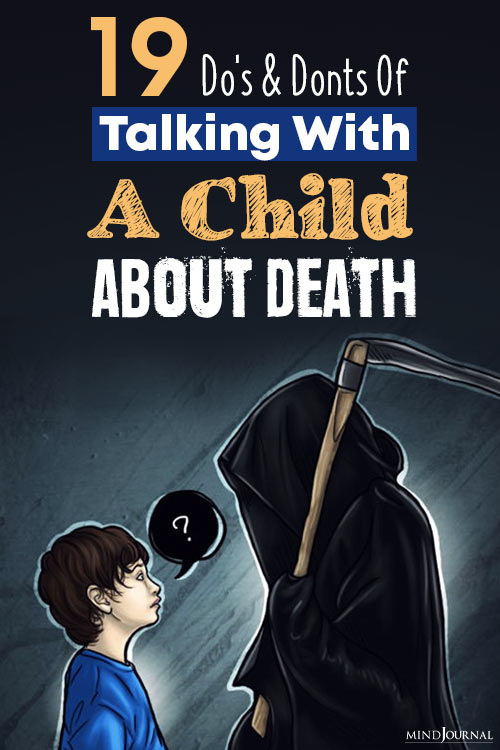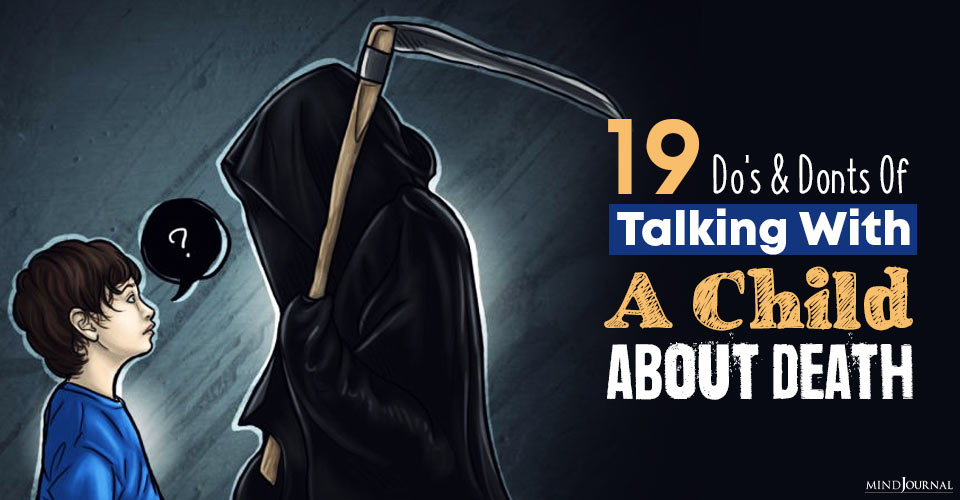Talking with a child about death is probably one of the toughest things an adult can do. And even more so, if it’s your own child. However, talking with a child about death can be a bit easier to do, if you know how to go about it. Read parenting tips to help grieving children.
It’s never easy to deal with death. As adults, it overwhelms us. And it’s even harder for children to move through. Though we know it’s an inevitable part of life, talking about death is something most of us aren’t really good at because the subject is so painful.
As many of us know, death occurs in many ways. It may be sudden, expected, prolonged, or accidental. Part of the experience is finding ways to express what’s happened, to make sense of what’s happened, and finally, to accept what’s happened.
Here are some parenting tips to help you talk about death with your child.
Related: How To Deal With Death and Dying As You Age
The Do’s and Don’ts of Talking with a Child about Death
Do’s
1. Tell the truth about what happened right away.
The truth gives an explanation for your tears and pain. Being open and emotional can help your child learn how to mourn.
2. Be prepared for a variety of emotional responses.
Realize that however you approach this subject, your child will be upset, and perhaps, even angry at the loss. Accept your child’s emotional reactions. You will have time to address things again after your child’s had time to process the initial trauma.

3. Make sure to use the words dead or died.
Many find using the words dead or died uncomfortable – and prefer using phrases like, passed away, lost, crossed over, went to sleep – but research shows that using realistic words to describe death helps the grieving process.
4. Share information in doses.
Gauge what your child can handle by giving information in small bits at a time. You’ll know what more to do based on the questions your child asks.
Related: The Stages Of Grief: Ways To Cope With Loss and Minimize The Pain
5. Be comfortable saying, “I don’t know.”
Having all the answers is never easy, especially during a time of such heartache. It’s helpful to tell your child that you may not know about certain things, like, “How did grandpa die?” “What happens to Aunt Rita at the funeral home?” “What made Spike run into the street, Mommy?” or other unanswerable questions.
6. Cry.
Cry together. Cry often. It’s healthy and healing.
7. Allow your child to participate in rituals.
Let children pick clothing for your loved one, photos for the memorial, a song, or spiritual reading. This will help them gain a sense of control of the traumatic loss.
8. Let your child grieve in his or her own way.
Allow your child to be silent about the death. It’s also natural for a child to feel lonely and isolate themselves at this time too. It’s also common for children to seem unaffected by the loss. There is no right way to grieve.
9. Prepare your child for what they will see in the funeral home or service.
Tell children what they will see, who will be there, how people may be feeling and what they will be doing. For young children, be specific in your descriptions of what the surroundings will look like.
For example, describe the casket and clothes and that the body will be posed. Or if it’s a memorial service, talk about where the body is, if it’s been cremated, in a closed coffin, or already buried. Bring along someone to care for the child if you are distraught.
Related: How To Deal With Grief: This Old Man Gave An Incredible Reply
10. Prepare your child for the future without your loved one.
Talk about how it will feel to celebrate birthdays, anniversaries, holidays, and special moments without your loved one. Ask your child to help plan how to move through the next calendar event.
11. Prepare to talk about thoughts and feelings often.
It is likely that you’ll have to tend to the subject of death for days, weeks, and months to come. Check-in and be available for ongoing discussions since mourning is a process.
12. Remember to take care of yourself.
As parents, we sometimes forget about taking care of ourselves during this time. Children learn what they see, so be a role model for self-care at this critical time.

Don’ts
1. Don’t hide your grief from your child.
Seeing you grieve during and long after your loved one’s death will let the child know that it’s normal and healthy to cry and feel sad after a significant loss.
2. Don’t be afraid to share memories of your loved one.
Sometimes parents feel afraid to talk about the person who has died, thinking it will cause pain to others. Research shows that the pain of re-living memories or sharing stories actually aids in healing and closure.
3. Don’t avoid connecting with your child because you feel helpless or uncomfortable, or don’t know what to say.
Sometimes a knowing look can be a powerful connection. Even a touch or a hug can offer great comfort.
Related: 8 Things You Should Never Say To Someone Who Is Grieving
4. Don’t change the subject when your child comes into the room.
Doing so places a mark of taboo on the subject of death. Instead, adjust your wording and level of information when a child is present.
5. Don’t change your daily routine.
Children need consistency. Try as much as possible to keep your usual daily routines at home and at work. Also, try to ensure that your child continues to take part in their usual activities like school and social events.
6. Don’t think that death puts a ban on laughter.
Laughter is a great healing tool. Being about to laugh about memories or moments with your loved one signals just how important their presence was in your life.
7. Don’t put a time limit on your child’s bereavement – or your own.
Everyone grieves in their own way. Recognize that a new normal will have to occur – and that time is needed to readjust to a significant death.
Related: Grief Has No Expiration Date; You Don’t Need to Feel Guilty for Your Sadness
If you need additional support, reach out to your child’s school, physician, or religious community. Professional help with a mental health therapist trained in bereavement can be sought as well.
Want to know more about how you should go about talking with a child about death? Check this video out below!
Written By Deborah Serani Originally Published On Psychology Today









Leave a Reply
You must be logged in to post a comment.